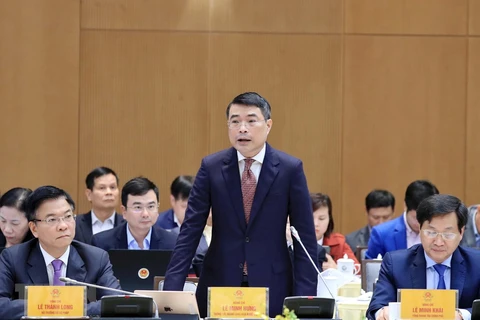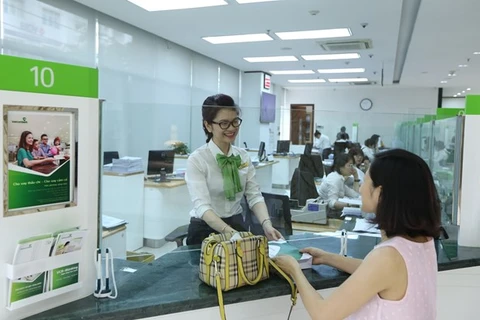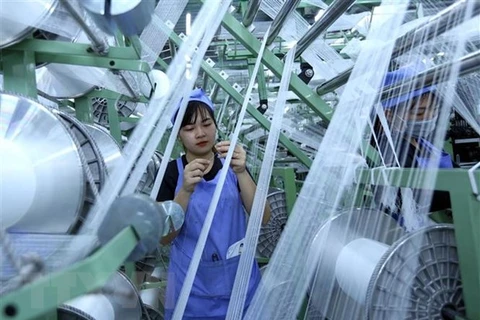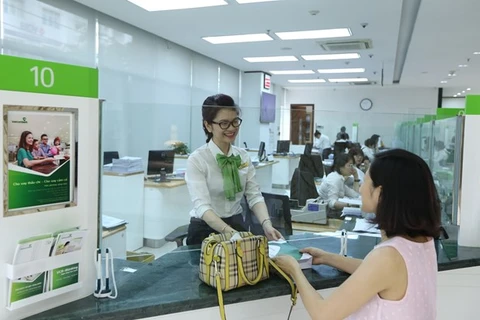Hanoi (VNA) - The State Bank of Vietnam (SBV) on March 12 announced that it has issued Circular No.01 on rescheduling repayment periods, waiving and reducing interest rates to support enterprises and people affected by COVID-19 epidemic.
The circular, which stipulates that credit institutions may retain loan groups classified in accordance with SBV’s regulations at the closest time to January 23, 2020 during the debt restructuring period, will take effect from March 13.
Credit institutions allowed to actively reschedule repayment
With three chapters and 10 articles, the circular also features a number of important contents related to the scope of restructuring repayment and criteria for determining loans affected by the disease.
Accordingly, debts subject to rescheduling are the outstanding amounts of principal and/or interest (including balances of debts subject to the Government's Decree No. 55/2015/ND-CP dated June 9, 2015 on credit policies for agricultural and rural development (amended and supplemented)) that fully satisfy the following conditions: arising from lending activities, financial leasing; the obligation to repay the principals and/or interest arising between January 23, 2020 and the day after 03 months from the date the Prime Minister announces the end of the COIVID-19 epidemic.
Credit institutions are entitled to maintain the classified debt groups in accordance with the provisions of the SBV at the closest time to January 23, 2020 with regard to the debt balances subject to loan repayment rescheduling, interest and fee waiver and reduction as prescribed in this circular.
They are requested to conduct debt classification and set up risk provisions in line with the restructured terms in accordance with legal provisions on debt classification, setting up and using risk provisions in order to address risks in the operations of credit institutions and foreign banks’ branches. However, the adjustment principles shall not be applied to debt groups with higher risk levels.
SBV Deputy Governor Dao Minh Tu stressed that the circular is an important legal corridor to create the most favourable conditions and mechanisms for credit institutions to implement debt restructuring for businesses affected by the health crisis.
With this circular, credit institutions will actively restructure loans for customers, Tu said.
He went on to say that credit institutions are responsible for issuing internal regulations on rescheduling debt repayment periods, waiving and reducing their interest and fees, and maintaining the debt classification in line with the SBV provisions, ensuring close supervision and safety, and preventing the abuse of the policy to make profit.
Tu expressed his belief that commercial banks will do this well.
According to the SBV, it is impossible to accurately quantify difficulties facing enterprises due to unpredictable developments of the disease. Therefore, this is the most practical and urgent solution for businesses in the context.
Chairman of Vietcombank's Board of Directors Nghiem Xuan Thanh said this is an important decision to support businesses and people affected by COVID-19.
8,000 borrowers entitled to interest rate exemption, reduction
Nguyen Quoc Hung, Director of the SBV’s Department of Credit for Economic Sectors, said the growth rate of outstanding loans has reached 0.1 percent so far this year, while the rate in the same period last year was 0.85 percent.
According to the preliminary statistics of the central bank, an estimated 926 trillion VND of outstanding loans affected by the pandemic, accounting for over 11 percent of the whole system’s loan balance.
Hung said many business associations have proposed the SBV consider measures to remove difficulties facing enterprises in this hard time.
Commercials banks have so far rescheduled over 21.7 trillion VND for difficult businesses, lowered lending interest rates for 8,000 borrowers with a total of over 350 billion VND.
They have also considered reducing interest rates for 34,350 customers with a total loan balance of 185 trillion VND, and providing new loans totaling 24 trillion VND for 5,493 customers.
Many banks have reduced or completely exempted their transaction fees for customers.
Hung stressed that the COVID-19 pandemic is developing more and more complicatedly on the globe, directly affecting businesses operating in export-import, tourism and transportation sectors.
The banking sector is ready to meet the capital demand of the economy both during and after the pandemic, he added./.

























